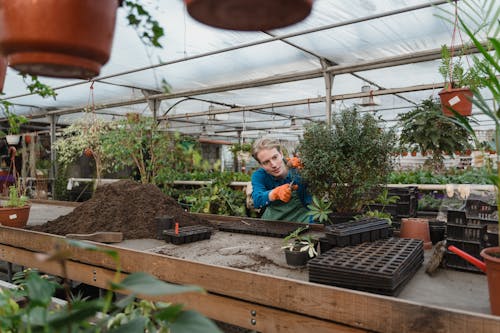
Our planet needs more environmentally conscious and eco-friendly inhabitants. Getting into the habit of being an environmentally friendly person is definitely something anyone can get used to.
Statistics show that thanks to everyday human activity, climate temperatures are rising at an unsustainable level. Pollution issues are greater than ever, and according to UN Scientists, we’re dealing with a “Code red” for humanity when it comes to the potential impacts of climate change.
When faced with all the evidence of our harmful impact on the planet, it’s easy to feel overwhelmed. From rising sea levels to complex heat waves, the symptoms of sickness our planet is showing seem too huge for us to handle alone.
Never believe for one second that you can’t make a difference to the planet’s health, as an individual.
The reality is that everyone’s individual efforts to be more environmentally conscious make a difference. Simply making a few lifestyle changes, with a focus on being “environmentally conscious” could be enough to make a significant difference to the planet’s future health.
What Does it Mean to Be Environmentally Conscious?
Often aligned with “eco-friendly”, “green” or “eco-warrior”, the term “environmentally conscious” simply means you take an active (conscious) approach to protecting the planet. Simply put, rather than just living your life without thinking about how you’re influencing the world around you, environmentally conscious people will assess their behaviours from a holistic perspective.
Being environmentally conscious essentially requires us to open our eyes to the impact we’re having on our planet each day, and make an effort to reduce our personal negative “footprint”. You might do things like assess whether or not you really need a shower, ensure you double-check your garbage for any recyclables, or use reusable water bottles instead of single-use ones.
While being environmentally conscious might seem a lot of work, it can actually be much simpler than you’d think. Below are some tips to be a more environmentally conscious person, with a less negative impact on the planet:

1. Commit to a Recycling and Reuse
First, one of the best things you can do to become more environmentally conscious, is learn how to recycle more consistently. Recycling conserves the natural resources we only have finite access to and minimizes the amount of waste we send to landfills.
Recycling aluminum alone (such as soda cans) is 92% more efficient than creating a can from scratch.
Recycling doesn’t have to just mean sorting your waste in the household either. You can also recycle goods by giving them new life. Donating your used furniture, clothes, and other items your fellow citizens can use to charity is an excellent way to ensure they continue to have a positive impact on someone’s life.
You can also buy second-hand items, such as nursery furniture or household items to reduce the impact of producing endless new products on the environment.
2. Be More “Anti-Plastic”
Plastic is one of the more problematic man-made materials in the world today. It takes hundreds of years for a single plastic bag to decompose, and these bags often pose a serious threat to wildlife after being dumped in locations around the globe.
Hundreds of thousands of marine animals die on a regular basis after mistaking plastic bags for food, and other animals get entangled in bags, leading to suffocation.
Start taking your own bags to the supermarket and reusing them every time you need to buy something. Outside of abandoning plastic bags, you can also commit to purchasing products which use less packaging overall.
A lot of more environmentally-friendly companies are beginning to cut down on the plastic they use in their products, switching for more environmentally-friendly options such as cardboard. There are even stores where you can take your own containers to fill up on detergent, laundry powder, sugar, and flour, rather than having to create more packaging waste.

3. Reuse Bottles and Buy Fewer “One Time Use” Items
Single-use products are all over our planet. Designed for convenience, these products are designed to be immediately thrown away after just one use. Think of paper towels and napkins, plastic and paper plates or cups, and other non-durable consumer goods.
We’re creating around 380 million tons of plastic each year, and up to 50% of that is for single-use purposes. Being environmentally conscious means replacing your “throwaway mindset” with a focus on getting the most out of everything you buy.
Swapping endless plastic bottles of water for a single reusable bottle is a good start. According to some researchers, producing, chilling, and transporting bottled water takes up to 2,000 times the energy required to produce tap water.
You can also use cloths and towels instead of disposable paper towels and wash them whenever necessary. Not only will you help the planet by buying fewer disposable products, but you’ll save money as well.
4. Buy What You Need, and Make it Last
We live in a world of rampant consumerism, where advertisements constantly tell us to buy more of everything, from cars and household products to furnishings. This constant pressure to consume leads to significant problems with our finances, but it can be very dangerous for the planet too.
Planning to avoid impulse buying and start buying only what you need, when you need it, can help you to live a more frugal lifestyle, while minimizing your carbon footprint.
At the same time, making sure you learn how to maintain and preserve the products you buy can be beneficial too. These days, there are countless videos and articles online that can teach you how to repair a tear in a dress instead of throwing it away or fix the broken heel on your favorite shoe.
Try asking yourself more often whether something really has no life left in it, or whether there may be a way to reuse, repair, or get something else out of the product. You could even upcycle and repurpose certain items. For instance, you can turn containers into toy organizers, or wine bottle corks into bathmats.
5. Dietary Changes
Most of us could benefit from making a few simple changes to our diet, whether it’s cutting down on saturated fats and sugars, or minimizing our consumption of soda. If you’re planning on eating healthier anyway, why not consider how the foods you eat could benefit the planet?
Being careful with what you eat is crucial to being more eco-friendly, particularly if you’re willing to cut down your consumption of red meat. Animal-derived food production has a much higher greenhouse gas output than vegetable and grain production.
While all meats have a higher impact on the environment than vegetables and fresh produce, red meat is usually the worst, because of factors such as increased methane production. Eating chicken instead of beef when you get a chance, or just having a single vegetarian meal per week could save the Greenhouse Gas equivalent of driving 1,160 miles.
6. Turn it Off
We consume about 23,900 terawatt-hours of electricity per day, and our demand for energy is increasing all the time. The age of digital transformation has made us increasingly reliant on technology in all its forms, from computers and the internet to games consoles and washing machines. Learning when to “switch off” could be one of the most environmentally conscious things you do.
Start by switching off the lights whenever you leave a room. While the cost of keeping a light bulb on won’t amount to much, the costs will gradually add up, for both your energy bill and the planet. It’s also worth turning more of your devices off rather than leaving them on standby.
Don’t just let your computer sleep through the night when you’re not using it or leave the television running to itself. Make a habit of turning everything off before you leave a room.
It’s also worth looking into ways you can reduce your reliance on electrically-powered machines. For instance, investing in a clothesline instead of using a clothes dryer can reduce the average household’s carbon footprint by 2,400 pounds per year.

7. Composting, Saving Water, and Ceasing Food Waste
Composting isn’t just a trend shared by influencers around the world, it’s also a powerful way to practice being environmentally conscious. Composting allows you to make the most of the various foods you don’t use in your home.
Ideally, you should be making a list each time you go shopping, to reduce your risk of buying more than you need. However, even if you’re particularly frugal, you’re still going to end up with things such as vegetable rinds and coffee grounds. Using these substances as a valuable addition to soils is a great way to start growing your own vegetables or supporting local farms.
When making the most out of your food, it’s worth looking into your options for saving water too. Using less water reduces both energy and infrastructure costs at the same time. There are plenty of ways to reduce your water use, such as:
- Regularly checking your homes for leaks
- Taking baths instead of showers
- Turning the water off while brushing your teeth
- Installing water-saving faucets
- Washing your dishes by hand
8. Drive Efficiently or Not at All
The more environmentally conscious you become, the more you’ll realize traditional cars, though convenient, emit an enormous amount of pollution. In an ideal world, we’d all be able to switch to electric cars to keep fuel emissions to a minimum, but if you can’t take this path, and you can’t afford to leave your car at home, then learning how to drive efficiently is a good start.
Driving gently can be all it takes to reduce your gas mileage by around 33% on the highway, and 5% in the city. You’ll reduce the amount of carbon emissions you’re sending into the air, and hopefully cut down your fuel bills too.
Where possible, it’s also worth leaving your car at home. Switch to a bike when the weather is ok, and travel to work in the sun. Consider walking to locations you can easily get to by foot and get a bit of extra exercise into your day while you give back to the planet.
Are You Environmentally Conscious?
New reports about the environmental issues we face on a daily basis are emerging all the time. Every day, we’re causing more damage to the planet we call home, and many of us don’t even realize how significant our impact is.
Making sure you pay attention to the world around you, and how you’re influencing it on a daily basis, will ensure you’re doing your part to protect the earth. At the same time, it could mean you end up eating a healthier diet, saving more money, and getting the amount of exercise you need for a happier and healthier life.






